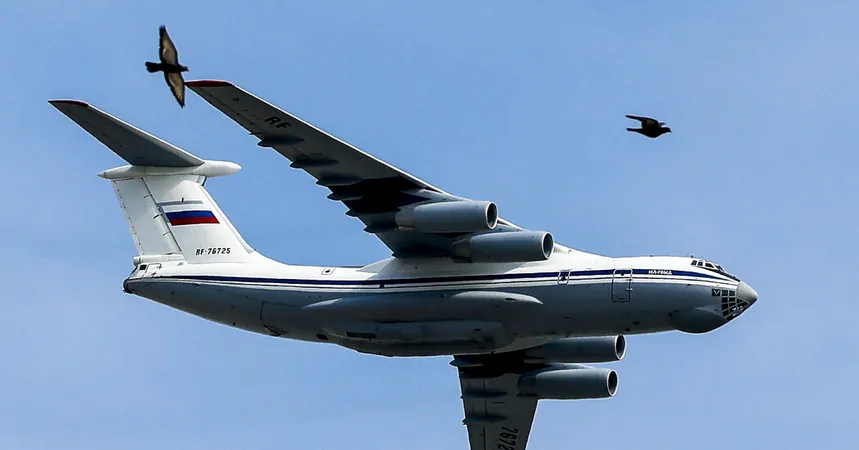
Uncertain Future: Russia Intensifies Military Support to Libya Amid Syrian Base Concerns
2024-12-20
Author: Ming
Introduction
In a dramatic shift in military strategy, Russia has ramped up cargo flights to Libya as uncertainty looms over its military bases in Syria. Following the recent upheaval in Syria that saw the overthrow of Bashar al-Assad, Russia has dispatched several cargo planes to reinforce its presence in the North African nation, according to Libyan military officials.
Increased Air Traffic and Military Supplies
Reports from al-Khadim air base in eastern Libya indicated that at least six Russian planes, some originating from directly within Russia and others from their Syrian bases, have arrived laden with military supplies since December 8. While the specific contents of these flights remain unverified, increased air traffic has been observed in the past week between Russia and Libya's eastern regions, which are predominantly controlled by forces aligned with Moscow.
Strategic Moves by Russia
Notably, four Il-76 cargo planes have made multiple flights from Moscow and Minsk to Benghazi, suggesting a concerted effort by Russia to bolster its military foothold in Libya. This comes at a time when Moscow is grappling with the potential loss of its significant military assets in Syria, where both a major naval base and an air base serve as critical points for projecting power into the Middle East.
Putin's Response to the Situation in Syria
President Vladimir Putin addressed the evolving dynamics in Syria during a news conference, stating, “We’ll need to decide for ourselves how our relationships will look with those political forces that now control and will control the situation in the country in the future. Our interests need to coincide.” These comments underline Moscow's meticulous approach to maintaining its influence in the region.
Analysis of Russian Engagement in Libya
A recent analysis by the American Enterprise Institute's Critical Threats Project suggests that Moscow's increased military engagement in Libya may be an attempt to reduce its dependence on its Syrian bases by enhancing its strategic positioning in North Africa. With the Libyan political landscape splintered into rival factions, Russia's support could be vital for its aligned forces in the east.
Libyan Conflict and Foreign Intervention
The Libyan conflict, which has been ongoing since 2011, saw foreign powers like Turkey and Russia intervening on opposite sides. The faction backed by Turkey governs the northwest, including Tripoli, while Gen. Khalifa Hifter leads the Kremlin-backed forces in the northeast, which also receive aid from the UAE and Egypt.
Concerns Over Military Shipments
Concerns are mounting as Libya’s transitional Prime Minister Abdul Hamid Dbeibah criticized Russia’s military shipments, claiming they threaten stability in a region already rife with turmoil. Dbeibah's government, recognized internationally but limited in authority in eastern Libya, has no jurisdiction over the forces receiving Russian support.
Civilian Aircraft and Clandestine Operations
In another troubling development, reports revealed that civilian aircraft arriving from Damascus coincided with the rebel takeover of Syria’s capital. Russian air transport companies linked to the ongoing Ukraine conflict have been noted for their clandestine operations, with sanctioned Belarusian cargo planes reportedly involved in these military ferrying activities to Libya.
Implications for Russian Strategy in the Middle East
As tensions rise, the importance of Libya to Russia becomes increasingly apparent; the country could serve as a strategic fallback for Moscow’s ambitions in the Middle East. With satellite imagery showing a significant presence of Russian military equipment moving from Syria to its bases, the international community watches closely, uncertain of how these developments will unfold.
Conclusion
As civil unrest continues to rock the Middle East, the strategic chess game involving global powers in Libya and Syria thickens. The simmering conflict, compounded by international interests, raises questions about the future stability of both nations and how the global arena will respond to Russia’s expanding military endeavors.



 Brasil (PT)
Brasil (PT)
 Canada (EN)
Canada (EN)
 Chile (ES)
Chile (ES)
 Česko (CS)
Česko (CS)
 대한민국 (KO)
대한민국 (KO)
 España (ES)
España (ES)
 France (FR)
France (FR)
 Hong Kong (EN)
Hong Kong (EN)
 Italia (IT)
Italia (IT)
 日本 (JA)
日本 (JA)
 Magyarország (HU)
Magyarország (HU)
 Norge (NO)
Norge (NO)
 Polska (PL)
Polska (PL)
 Schweiz (DE)
Schweiz (DE)
 Singapore (EN)
Singapore (EN)
 Sverige (SV)
Sverige (SV)
 Suomi (FI)
Suomi (FI)
 Türkiye (TR)
Türkiye (TR)
 الإمارات العربية المتحدة (AR)
الإمارات العربية المتحدة (AR)